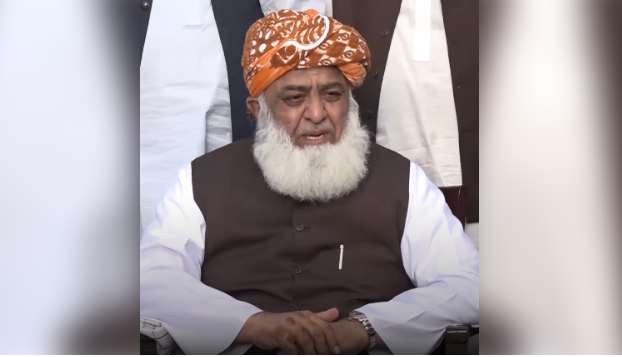Dera Ismail Khan (Web Desk): Jamiat Ulema-e-Islam (JUI-F) chief Maulana Fazlur Rehman has asserted that the controversial Madrassa Registration Bill has effectively become law, despite objections raised by President Asif Ali Zardari more than a month after the bill’s passage.
Speaking at a press conference in Dera Ismail Khan on Thursday, the JUI-F chief criticized the delay in the president’s objections, arguing that, under the law, the bill should have automatically been enacted as law after 10 days had passed without any formal objections.
He added the bill had already undergone thorough review and deliberation, involving various state institutions, including the Ministry of Law.
Maulana Fazlur Rehman emphasized that discussions on the bill had been conducted in consultation with leaders from the Pakistan Peoples Party (PPP), including President Zardari and Bilawal Bhutto.
The JUI-F leader questioned the president’s late objections, pointing out that all relevant parties, including the PPP and Pakistan Muslim League-Nawaz (PML-N), had agreed to the bill’s terms.
“The bill was drafted by the government before the elections, and despite our reservations, we accepted the terms. Why is the government distancing itself now?” Rehman said, adding that the delays had been caused by external factors deliberately aimed at creating divisions among religious seminaries.
Rehman accused certain groups of intentionally provoking opposition to the bill, leading to unnecessary conflicts between different seminaries.
He made it clear that JUI-F had no issues with religious scholars or seminaries themselves, but rather with those responsible for fueling tensions.
He also expressed frustration over the government’s failure to implement key provisions agreed upon earlier, such as facilitating the opening of bank accounts for seminaries and granting visas to foreign students.
In a further legal argument, Rehman cited precedents from the tenure of former President Arif Alvi, claiming that after the legally required 10-day period without objections, the bill should be regarded as law.
He pointed out that the president’s objections had been delayed for over a month and, according to legal precedents, the bill should now be considered binding.
“If the matter remains unresolved, JUI-F will take legal recourse and seek intervention from the courts,” Rehman warned.
The JUI-F chief also announced that his party would convene a meeting of religious seminaries on December 17 to deliberate on their next steps and decide the future course of action.
The JUI-F chief concluded by issuing a stern warning against any moves to place religious seminaries under direct government control, which he claimed would lead to further deterioration of religious education in the country.
“We do not want seminaries to be under the supervision of any directorate. Previous government actions have already harmed the quality of religious education, and we will not allow this to continue,” Maulana Fazlur Rehman said.


